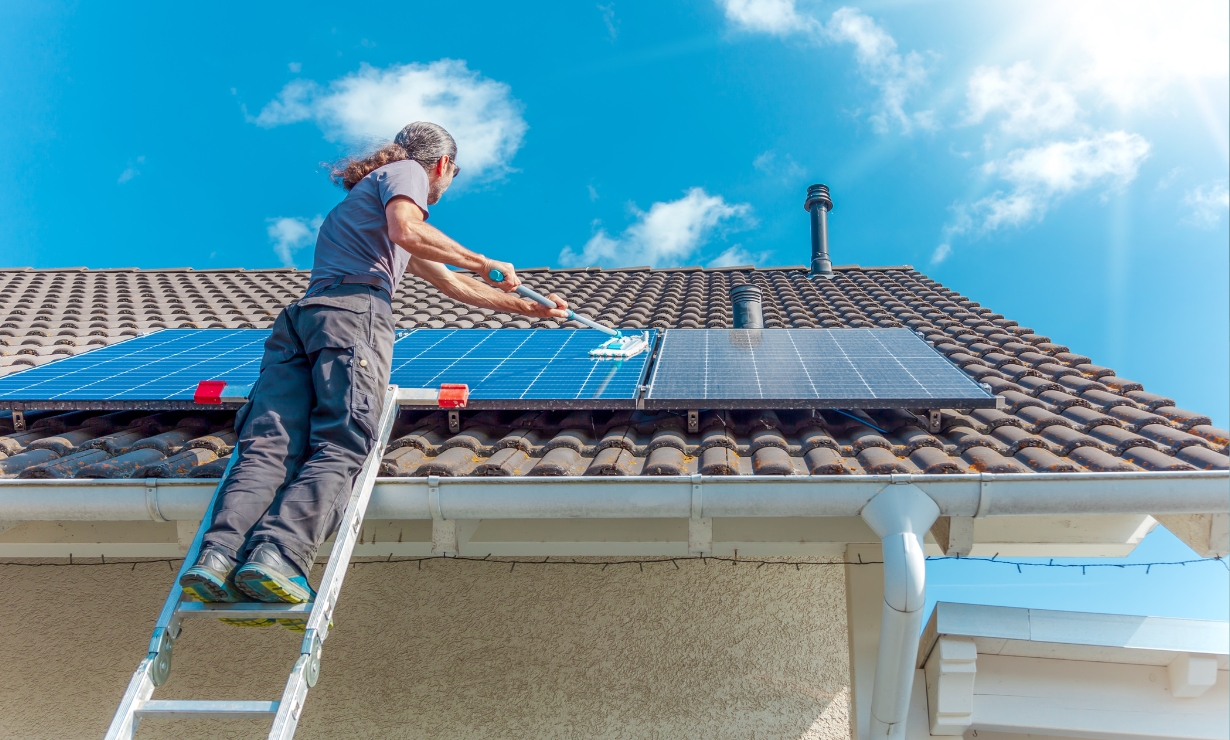
Solar panels are an amazing investment — they lower your electric bill, reduce your carbon footprint, and increase your property value. But like any outdoor surface, they get dirty over time. Dust, pollen, bird droppings, and pollution can all reduce their efficiency. 🧼💡
So what’s the best way to clean them? Many people wonder if power washing is a good solution. It’s fast, effective, and readily available. But is it safe?
In this article, we’ll cover whether you should power wash solar panels, the risks involved, the best cleaning methods, and how to safely maintain your system for maximum performance and lifespan. Let’s dive in! 🔍
⚡ Why Clean Solar Panels at All?
It’s easy to forget that your solar panels are even up there. But regular cleaning can significantly impact performance — especially in dusty or pollen-heavy regions.
💡 Dirty Panels = Less Energy
Studies have shown that buildup from:
- Dust
- Pollen
- Bird droppings
- Mold and mildew
- Soot and pollution
…can reduce solar efficiency by 5% to 30%, depending on the severity. 😬
Even a thin layer of grime can block sunlight, which means:
- Higher utility bills
- Less energy production
- Slower ROI on your solar investment
🧽 Is Power Washing Safe for Solar Panels?
This is where things get tricky. While power washing may seem like an easy fix, it can actually damage your solar panels if done incorrectly. 😟
⚠️ Risks of Power Washing Panels:
- Too Much Pressure = Cracks
- High PSI can crack the glass, especially if the panels are older or weakened from temperature changes.
- Microfractures may not be visible but can reduce performance or void your warranty.
- Water Intrusion
- Water can seep into seals or junction boxes if sprayed at the wrong angle.
- This can cause short-circuiting or corrosion over time.
- Surface Scratching
- Dirty nozzles or aggressive spraying can leave fine scratches.
- Scratches can scatter sunlight and lower efficiency.
- Invalidating Your Warranty
- Many manufacturers explicitly warn against pressure washing, and damage caused this way may void your coverage.
🚫 Bottom line: Unless you really know what you’re doing, traditional power washing is not recommended for solar panels.
✅ Best Way to Clean Solar Panels
🧼 Gentle Cleaning is Key
To safely clean your panels, use these tools:
- A soft-bristle brush or sponge
- A telescoping pole (if roof-mounted)
- Deionized or distilled water (to prevent mineral spots)
- A mild, non-abrasive soap (if needed)
- A low-pressure hose spray, not a power washer
Browse Amazon Here For Soft Washing Equipment And Accessories
🧑🔧 Cleaning Steps:
- Choose a cool, overcast morning or evening (not full sun).
- Rinse the panels with a gentle stream of water.
- Lightly scrub any debris with the soft brush.
- Rinse again thoroughly to remove soap or residue.
- Let air dry — or squeegee for a spotless finish.
💡 Cleaning in full sun can cause water to evaporate too quickly and leave streaks or damage from sudden temperature shifts.
🧰 Can Professionals Use Power Washing on Panels?
Yes — but only trained pros with the right equipment should attempt it.
Some companies use:
- Low-pressure soft washers
- Pure water-fed poles
- Special attachments that reduce PSI to below 200 (safe range)
🔧 These tools are designed specifically for delicate surfaces like solar panels and windows. If you want a faster clean, it’s best to hire a solar cleaning specialist who understands how to avoid damage.
📍 When and How Often Should You Clean?
This depends on your location:
| Region Type | Recommended Cleaning Frequency |
|---|---|
| Dry/desert (dusty) 🌵 | Every 3–4 months |
| Urban/industrial 🏭 | Every 4–6 months |
| Coastal (salt air) 🌊 | Every 4–6 months |
| Suburban (low debris) 🏡 | 1–2 times per year |
🗓️ A quick visual check every 1–2 months is smart — especially after storms, construction nearby, or heavy pollen seasons.
🔍 Signs It’s Time to Clean Your Panels
- You notice a dip in energy output
- Panels look dusty, cloudy, or streaked
- You spot bird droppings or tree sap
- Your inverter shows abnormal performance
🧼 Regular maintenance = better results = lower energy bills. It’s worth the effort!
🧠 Bonus Tips
- Avoid abrasive cleaners or tools
- Never stand on panels (they can crack)
- Use safety gear or hire a pro if roof access is required
- Monitor energy output to gauge effectiveness after cleaning
✅ Final Thoughts
Power washing your solar panels might seem like a quick fix, but it’s risky without the proper technique and tools. High pressure can do more harm than good — potentially damaging your panels, reducing efficiency, or voiding your warranty. ❌💥
Instead, opt for:
- Soft brushes 🧹
- Gentle hoses 🚿
- Pure water 💧
- Or a trusted professional service 👷♂️
Keep your investment shining — and producing — at its best. A little careful cleaning can go a long way toward saving energy and money. ☀️💵
Browse Amazon Here For Soft Washing Equipment And Accessories



